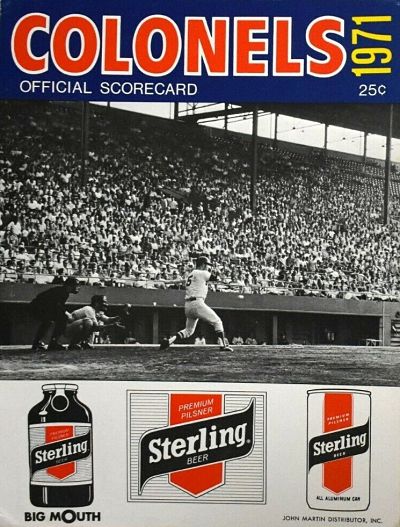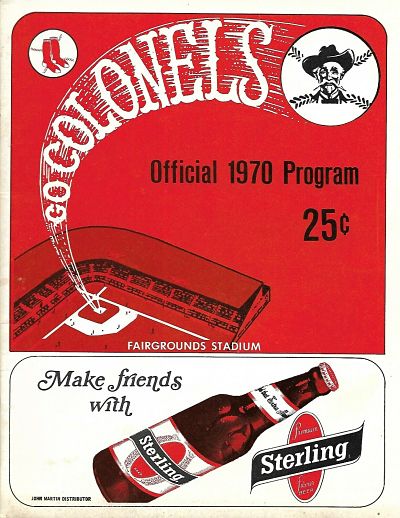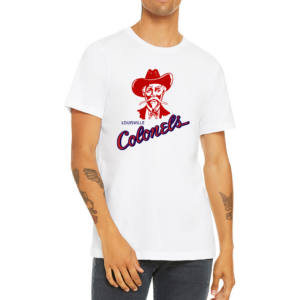International League (1968-1972)
Tombstone
Born: October 18, 1967 – The Toronto Maple Leafs relocate to Louisville, KY
Franchise Forfeited: November 22, 1972
Moved: November 1972 (Pawtucket Red Sox)
First Game:
Last Game:
Governor’s Cup Championships: None
Stadium
Ownership & Affiliation
Attendance
Tap (mobile) or mouse over chart for figures. Tilting your mobile device may offer better viewing.
Source: The Encyclopedia of Minor League Baseball (1st ed.), Lloyd Johnson & Miles Wolff, 1993
Best Seller
Louisville Colonels Logo T-Shirt from Royal Retros, available in navy, red, gray, and white.
Background
The Louisville Colonels were the top farm club of the Boston Red Sox from 1968 to 1972. The team was a revival, in name at least, of Louisville’s long-time Class AAA Colonels who played 61 seasons in the American Association from 1902 until that league’s demise at the end of the 1962 season.
Walter Dilbeck, a real estate developer from Evansville, Indiana, purchased the Toronto Maple Leafs of the International League for $65,000 (Louisville Courier-Journal 10/19/1967) in October 1967 and moved the club to Kentucky.
The biggest name to come through Louisville during the Red Sox era was catcher and future Hall-of-Famer Carlton Fisk (Colonels ’71). The Colonels also developed several other future Major League stars during the five-year run, including:
- Pitcher Ken Brett (Colonels ’69-’70)
- Outfielder Ben Oglivie (Colonels ’71)
- First baseman Cecil Cooper (Colonels ’72)
- Outfielder Dwight Evans (Colonels ’72)
The Misadventures of Private Dilbeck
The Colonels founder was a larger-than-life huckster of questionable means. Walter Dilbeck was a war hero turned self-made man. As an infantryman in Western Europe, Dilbeck held his position against a German attack in April 1945, killing or wounding 60 SS troops. Dilbeck returned home to Indiana and went into real estate. He arrived in Louisville in 1967 touting the development of a movie based on his life story. O.K., Private Dillbeck was coming to a theatre near you, he claimed, perhaps starring Mickey Rooney or Ann Margret or George Hamilton.1Frank, Bill. “Evansville AABC Team Sponsor Was War Hero, Now Millionaire”. The Enquirer (Battle Creek, MI). July 2, 1967
Dilbeck’s grandest ambition was nothing less than the formation of a third Major League. Already in the works when he formed Colonels in late 1967, Dilbeck announced plans for his Global League in September 1968. And it was … bananas. The league would feature four Japanese clubs, plus Jersey City and a Louisville franchise that would be separate from the Colonels. Or something. The declared membership all depended on the day and who was listening. Proposed innovations included unlimited substitutions, mandatory bed times for ballplayers, and dancing Geisha girl shows during a 30-minute”halftime” show during the 5th inning.
The Colonels led the International League in attendance in 1968 with 243,987 fans. So Dilbeck’s fellow IL owners were somewhat mystified when he ran up $160,000 in unpaid obligations during Louisville’s debut season. Dilbeck came under pressure to sell the Colonels. When he and his proposed buyer failed to close the deal, IL President George Sisler took the extraordinary measure of revoking the Louisville franchise on opening day of the 1969 season. The Colonels future was cast into serious doubt. Rain washed out the Colonels’ first two games of the season and bought crucial hours for local businessman Bill Gardner to step forward and rescue the ball club.
The Global League debuted in Venezuela a few days later on April 24th, 1969. The league staggered along in the Caribbean for just a few weeks. Dilbeck failed to pay any of the league’s bills or salaries. Dozens of ballplayers were stranded overseas when the whole enterprise went kaput.

Departure & Aftermath
Louisville won the 1972 International League pennant with an 81-63 record. In late August the Kentucky State Fair Board evicted the Colonels in order to renovate Fairgrounds Stadium for the U of L football program. A few weeks later the Colonels faced the Tidewater Tides in the Governors’ Cup championship series, losing 3 games to 2. These proved to be the final games the Colonels ever played in Louisville.
With no other viable ballpark, owner Bill Gardner forfeited the franchise back to the International League in late 1972. Joe Buzas, owner of the Red Sox’ Class AA Eastern League farm club in Rhode Island, paid $25,000 for Louisville’s membership and upgraded his Pawtucket Red Sox to Class AAA status. Pawtucket remained Boston’s top farm club for the next 47 years.
Louisville field managers Eddie Kasko (Colonels ’68-’69) and Darrell Johnson (Colonels ’71-’72) both ascended to the top job with the Red Sox. Kasko guided the BoSox from 1970 through 1973. Johnson replaced him in 1974 and took the 1975 Red Sox to the World Series with the helpful of several fellow Colonels’ alumni, most notably Carlton Fisk who blasted his iconic walk-off home run in the 10th inning of Game 6.
Walter Dilbeck went to prison in 1977 on tax evasion charges.
Pro baseball returned to Louisville in with the arrival of the Class AAA Redbirds of the American Association in 1982. The Redbirds drew 868,418 fans that summer, shattering Minor League Baseball’s single-season attendance record by more than 200,000 souls. In 1983 the Louisville Redbirds became the first Minor League Baseball team to draw over one million fans in a season.
Trivia
During the five seasons the Colonels played in Louisville, the city’s American Basketball Association franchise was also known as the [Kentucky] Colonels.
During the 1970 season the Colonels were owned by Bill Gardner and managed by Billy Gardner, but they were two different men. William A. Gardner, the club owner, was a Louisville shopping center operator and a nephew of Boston Red Sox owner Thomas Yawkey. Billy Gardner was a former Major League infielder working his way up the managerial ranks. He would go on to manage the Minnesota Twins and the Kansas City Royals in Majors during the 1980’s.
Louisville Colonels Shop
[auction-nudge tool=”listings”]
In Memoriam
Team owner Walter Dilbeck (Colonels ’68) died of heart failure in May 1991 at age 72. New York Times obituary.
Manager Darrell Johnson passed away on May 3, 2004 at age 75 after a battle with leukemia. New York Times obituary.
Links
###


